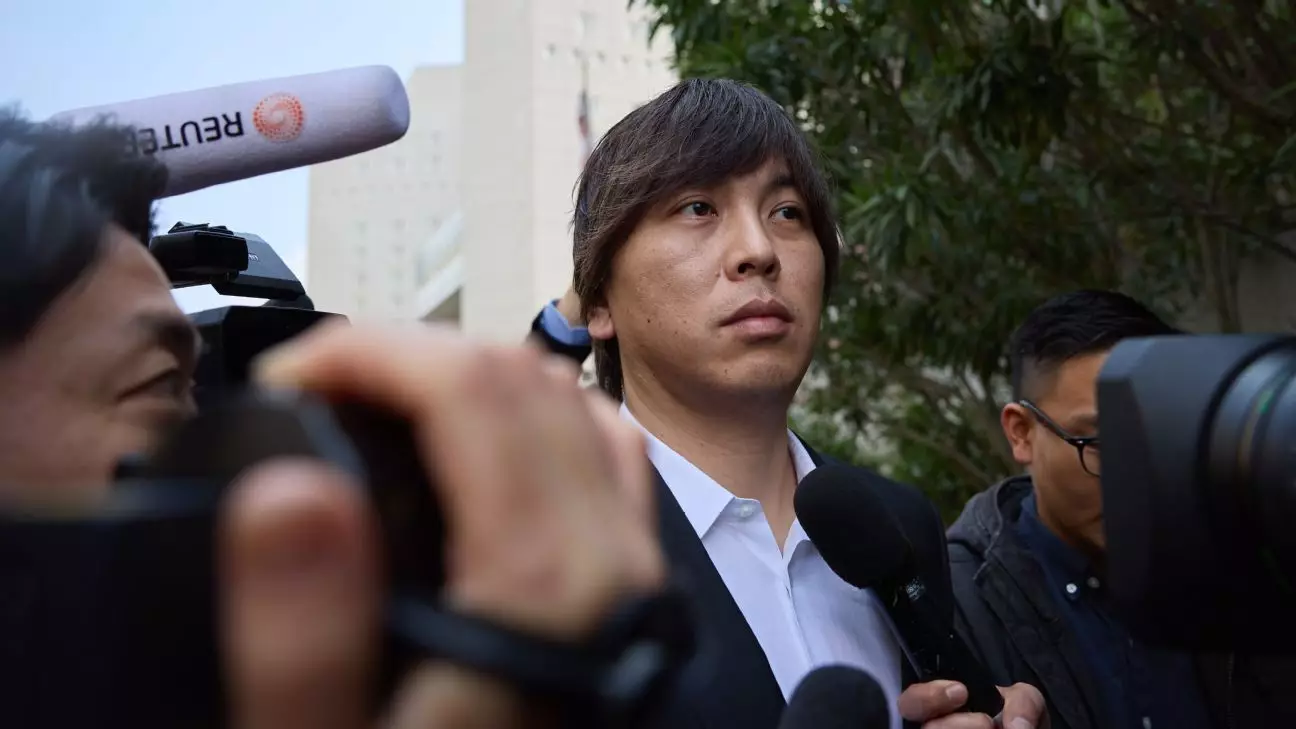The saga between Shohei Ohtani, the Los Angeles Dodgers superstar, and his former interpreter, Ippei Mizuhara, has unfolded into a dramatic legal battle that raises poignant questions about trust, betrayal, and the complexities of addiction. In a recent filing from federal prosecutors, the narrative surrounding Mizuhara’s alleged theft from Ohtani, purportedly to cover gambling debts, has taken on a more disturbing hue, revealing the stark dichotomy between perception and reality.
At the heart of this unfolding story is Mizuhara’s assertion that his criminal actions stemmed from a “long-standing addiction” to gambling, a claim that presupposes an understanding of human frailty and addiction’s potential to warp moral judgment. Yet, the prosecutors have systematically dismantled this notion, citing a lack of evidentiary support for Mizuhara’s addiction prior to the embezzlement. Court documents detail an exhaustive investigation encompassing over 30 casinos but only yielding minimal instances of legal betting activity — notably a single $200 expenditure at the Mirage casino in 2008.
Mizuhara’s defense hinges upon the idea of remorse and the psychological impact of his alleged addiction, yet prosecutors argue that these claims are nothing more than “self-serving and uncorroborated statements.” In a world rife with legal narratives crafted for the courtroom, the distinction between genuine remorse and strategic culpability is essential. It invites us to ponder: how often do individuals regret their actions because they are truly contrite, versus being simply remorseful at the prospect of punishment?
Financial Deception: The Unfolding of a Fraudulent Scheme
Mizuhara’s actions present a troubling portrait of avarice cloaked in deceit. Initially, the prosecutor’s filing highlights the staggering sum Mizuhara purportedly stole from Ohtani — billions of dollars siphoned away ostensibly to pay gambling debts that prosecutors contest never existed to the extent claimed. The crux of the argument revolves around a pivotal fraudulent wire transfer of $40,000, occurring during a period when Mizuhara boasted a checking account balance exceeding $34,000.
This raises an essential question: if Mizuhara had available funds, why resort to thievery? In the realm of personal finance, the fundamental tenant of managing one’s expenses posits that responsible individuals prioritize their financial integrity. The prosecutors contend that Mizuhara was not only financially stable but also diverted winnings from his illicit betting activities back into personal accounts, showcasing a level of premeditation that belies his claims of desperation.
A troubling theme surfaces — that of taking advantage of proximity to wealth. Mizuhara’s position allowed him insights into Ohtani’s financial flow, and rather than acting with integrity, he compounded betrayal by exploiting his role. Such dynamics within personal relationships, particularly those involving financial dependency, often lead to catastrophic outcomes, particularly when trust is breached.
Adding fuel to the fire is Mizuhara’s narrative regarding struggles with rent and living expenses, which prosecutors have effectively dismantled with concrete evidence. Mizuhara claimed he was “living paycheck to paycheck,” yet bank statements revealed that he was misappropriating Ohtani’s resources to cover personal expenses covertly. This deception creates a vivid picture of an individual not just operating under the guise of hardship but willfully engaging in a duplicitous lifestyle.
By failing to acknowledge the sheer magnitude of the breach of trust — using Ohtani’s debit card without permission — Mizuhara created a complex web that bolsters the prosecution’s argument. It’s essential to recognize that such actions reflect a broader commentary on morality; the blurred lines between help and exploitation can lead to disastrous consequences, as evidenced by Mizuhara’s misdeeds.
As the case moves towards sentencing, the prosecution has sought a prison term of nearly five years, emphasizing the necessity for accountability in the face of betrayal. They assert that Mizuhara’s actions and attempted justifications demonstrate a troubling pattern of deceit that merits a significant period of incarceration. The request for over $16 million in restitution serves as an acknowledgment of the profound damage inflicted upon Ohtani, not just financially, but in terms of trust.
The complexities surrounding the Mizuhara-Ohtani case serve as a cautionary tale about trust, greed, and the fragility of human relationships. As society grapples with issues of addiction, morality, and accountability, this saga resonates on multiple levels, compelling us to confront uncomfortable truths about our choices and their ramifications. The forthcoming sentencing will undoubtedly shape the narrative further, but the lessons it imparts are bound to persist, challenging our notions of redemption and justice.


Leave a Reply